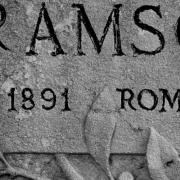For the Possibility That She Can Live, Kira Argounova Gives the Criminal Gang More Rope
Now that we are deep into Part I of We the Living, its interesting that on Sunday August 16th, philosopher Harry Binswanger recalled his first experience with Ayn Rand’s 1936 novel. As a freshman at MIT in 1960, he attended a lecture and became not only enchanted with Rand’s ideas, but also the clarity of her convictions. Soon after, he tackled an intellectual and emotional tour de force, Atlas Shrugged.
After returning from John Galt’s world, he was surprised by the equally impressive and psychological The Fountainhead, then the science fiction-like Anthem, and lastly We the Living. Aware that Rand’s earliest novel was the closest to an autobiography, he thought, “It won’t be very much. It will be one of these novels about a person’s childhood.”
It was the same thing over again! And I fell in love with Kira. So I love We the Living. I can see now that it was Ayn Rand from the beginning. True, it wasn’t as philosophical, but it was love of life, the love of freedom, and the love of a woman for a man.
That man is Leo Kovalensky, a fugitive from the Soviet police. Chapter 7 sealed Kira’s emotional desire when she whispered, “I was thinking about you, today. Were you thinking about me?” Leo replied, “You know what I wanted to tell you?”
Without thought, without will or question, in a voice that was someone’s order to her, not her voice, she answered, “Yes.” And someone’s order to her repeated through her lips, persistently, hungrily, insanely: “Leo, I love you.”
However, Soviet friend Andrei had taken her to the opera the previous evening. To prepare for the event, Kira spent hours with her mother and sister to create a new dress from an old one. Later that night at home, the girl who didn’t care what she wore “remembered regretfully that he had said nothing about her new dress.” The dress was something she made, because she wanted it, and recognition for what is good.
While Andrei’s Communist pathology prevents him from recognizing the desires of others, Chapter 8 illustrates the same disregard for human life that was inflicted on his family by the Czar’s police. Yet during the Revolution, the morning after a battle, he shows mercy to an enemy soldier. “As long as one can walk . . . ,” said Andrei. “One walks,” finished the man. They fight for the sake of the fight. Is this a contradiction? In our online forum, Doctor J checks its premise,
Andrei is not noble. He has allowed himself to be brainwashed. An honorable man thinks for himself. Like a lot of citizens during that time in Russia, honorable behavior was only on display when leadership wasn’t watching. When they were, they towed the party line.
And Kira understood the Party line, as well as the punch line. When interrogated by Andrei’s accomplice, Pavel Syerov, about meeting with Leo, “Who was that man at the gate with you last night?” She replies, “What man? He repeats, “Who was that man? Kira resists, I wasn’t interested enough to ask him.” Syerov continues, “Very well. I won’t ask you that.” Kira then asks, “Who was that man?” Syerov pounds the table, “Citizen Argounova, do you have to be reminded that this is no joke?” Kira was ready, “If it isn’t, will you tell me what it is?” Pavel unravels, “You’ll understand what it is and damn quick.”
Here, Gen Z’er Kira has exposed Rand’s sense of humor and Pavel’s greatest weakness – he has nothing without public cooperation. She knows his object is unearned wealth, his carrot is social justice, and his stick is his criminal gang. Greed, envy, and fear are also the hallmarks of today’s Democratic party.
In chapter 3, we were treated to Kira’s sense of justice. A bully at her school in Crimea had “declared a boycott against a freckled little girl.” Kira, who normally ate lunch alone, was confronted while sitting with this girl. “Do you know what you’re doing, Argounova?” demanded the leader of the girl gang. “Eating mush. Won’t you sit down?” Instead, the thug asks, “Do you know what this girl here has done?” Kira replies, “I haven’t the slightest idea.”
In both cases, Kira adopts the technique of playing by their rules and giving them more rope for hanging themselves. The bully responds, “You haven’t? Then why are you doing this for her?” Kira was ready, “You’re mistaken, I am not doing this for her. I am doing it against twenty-eight other girls.” The bully unravels, “So you think its smart to go against the majority?” Democracy in action.
Today, the joke is the so-called Democratic National Convention – a show about nothing except airing grievances. A Festivus celebration of wiseguys embalming Joe Biden as honorary crime boss, er, beacon of hope and change. Lurking at the forum, Uncle Bob relates, “I briefly studied education at Moscow State in 1973. I have a feel for the dialectic of those times and how, even now, people who grew up in that respond to the world.“
In 2020 America, Democratic mob hatred of the individual is focused on President Trump, so he’s out there giving them more rope, ‘if this convention isn’t a joke, will you tell me what it is? I haven’t the slightest idea.’ The malevolent universe of President Obama’s hope and change is why Trump ran for President. Portland’s punks, Chicago’s chaos, Baltimore’s blight and the destruction of New York as a world-class city come to mind.
In 1920’s Russia, Andrei’s criminal mob religion was political propaganda, its church was government, and its baptism was fire. Their goal was to wrest power from the feudalism of Czarist Russia, whose church was medieval. Their shared enemy was, and is, the individual. In Chapter 9, Kira explains,
If I asked people whether they believed in life, they never understand what I meant. So I ask if they believe in God. If they say they do, then I know they don’t believe in life. Whoever places his highest conception above his own possibility thinks very little of himself and his life.
Kira continues, “It’s a rare gift to feel reverence for your own life. To want the highest possible, now, for your very own.” Andrei unravels, “You’re a strange girl.” To which Kira tells him, and us, “You see, you and I, we believe in life. But you want to fight for it, to kill for it, even to die – for life. I only want to live it.”
In America.






